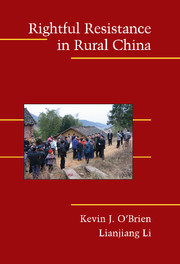Book contents
5 - OUTCOMES
Published online by Cambridge University Press: 05 September 2012
Summary
Concepts may not be about outcomes, but politics is. In the final analysis, the significance of any form of popular contention depends on its effects. What consequences does rightful resistance have for those who wage it, for villagers who observe it, and for policy implementation? And what can we learn about how the outcomes of contention arise by exploring rightful resistance in the Chinese countryside?
Thinking about Consequences
Gauging the impact of popular protest is notoriously difficult. Questions of causality and definition dog even the most careful attempts to link an episode or cycle of contention to a specific outcome (Amenta, Carruthers, and Zylan, 1992: 310; della Porta and Diani, 1999: 231–33; Giugni, 1998, 1999; Kriesi et al., 1995: 207–8). Grappling with all the factors that come together to produce social, political, or personal change becomes only more complicated when the indirect and unintended effects of collective action are taken into account (Linders, 2004; Tilly, 1999). Given the many obstacles researchers face, it is no wonder that studies of both resistance and social movements have traditionally paid more attention to the origins and dynamics of contention than to its consequences (Burstein, Einwohner, and Hollander, 1995: 276; Cress and Snow, 2000: 1094; Kriesi et al., 1995: 208; McAdam, McCarthy, and Zald, 1988; Scott, 1985).
- Type
- Chapter
- Information
- Rightful Resistance in Rural China , pp. 95 - 115Publisher: Cambridge University PressPrint publication year: 2006

